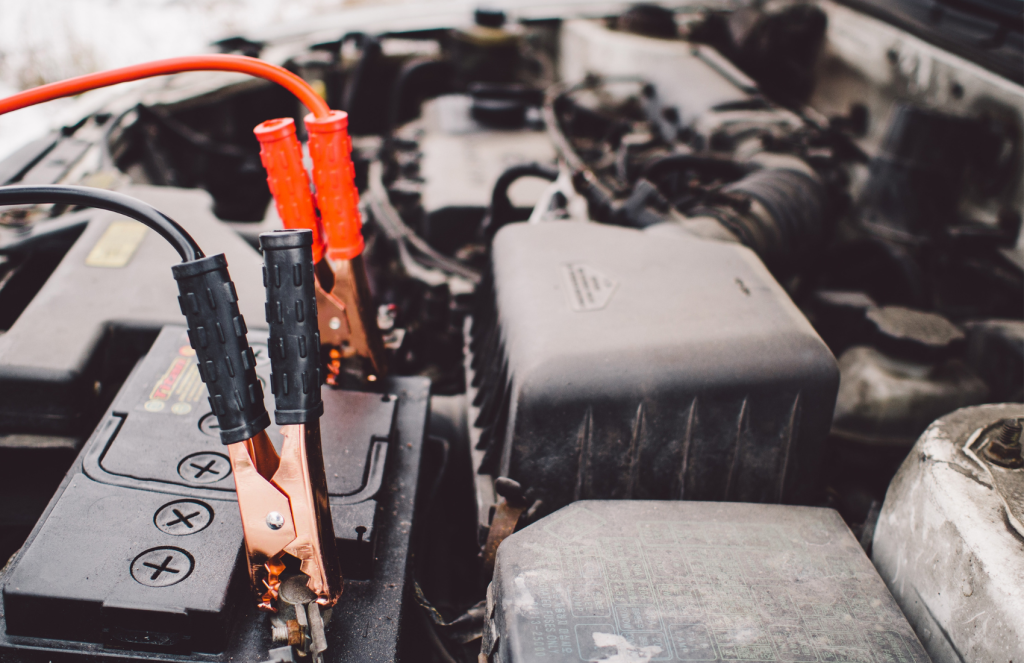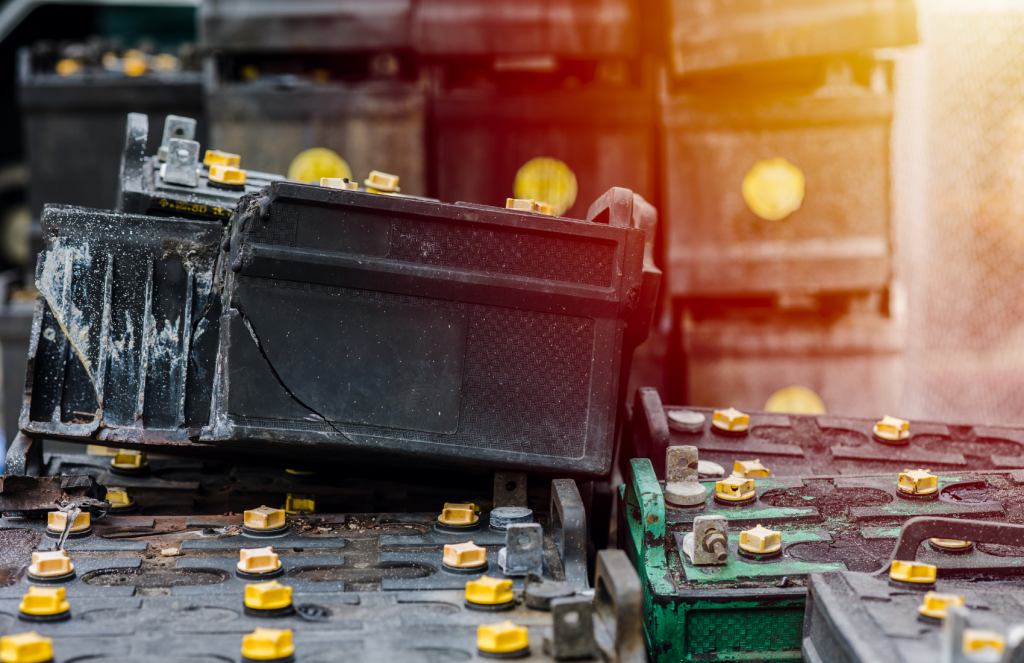How to Properly Dispose of Car Batteries: An Expert Guide
At CJD E-Cycling, we’ve recycled thousands of batteries over the years, and one thing has become crystal clear: proper disposal isn’t just good for the environment—it’s essential for your safety and potentially your wallet too.
Whether you’ve just replaced your vehicle’s dead battery or you’re clearing out your garage, that old car battery needs special handling. But don’t worry—we’ve created this comprehensive guide to walk you through everything you need to know about car battery disposal based on our years of hands-on experience.
The Hidden Dangers of Improper Car Battery Disposal
That heavy box under your hood isn’t just another piece of metal. Car batteries contain sulfuric acid and lead—materials that don’t belong in landfills or, worse yet, dumped somewhere they can leak into soil and water sources.
Just last month, we received a car battery that had been sitting in someone’s garage for over two years. The casing had begun to crack, and the acid was starting to leak. This situation isn’t just an environmental hazard—it’s a safety risk for anyone who comes into contact with it.
What happens when batteries end up in the wrong place?
- Soil contamination: The lead and other heavy metals can leach into the ground, making it unsuitable for plants and potentially contaminating groundwater.
- Water pollution: Just one improperly disposed battery can contaminate up to 400,000 gallons of water—enough to meet the daily needs of 2,000 people.
- Air pollution: When batteries are incinerated, they release toxins into the air.
- Legal consequences: In Missouri, improper disposal can result in fines starting at $500, with much steeper penalties for commercial violators.
Before You Touch That Battery: Safety First
Before you even think about removing your car battery, you need to gear up correctly. We’ve seen too many cases of acid burns and ruined clothing to take this lightly.
What You’ll Need:
- Safety glasses to protect your eyes from potential acid splashes
- Acid-resistant gloves (rubber or nitrile work well)
- Long-sleeved clothing that you don’t mind getting dirty
- Basic tools (typically a wrench to loosen battery connections)
- Plastic container or cardboard box lined with a plastic bag for temporary storage
Step-by-Step Battery Removal:
- Turn off your vehicle completely and remove the keys from the ignition.
- Locate the battery and identify the positive (+) and negative (-) terminals.
- Always disconnect the negative terminal first (usually black), then the positive (usually red). This reduces the risk of electrical shorts.
- Remove any brackets or clamps securing the battery.
- Lift the battery straight up using the built-in handle or by gripping it firmly at the bottom. Car batteries typically weigh 40-60 pounds, so be prepared for the weight!
- Immediately place the battery in your prepared container with the terminals facing up to prevent any residual acid from leaking.
If you notice any white powder (corrosion) on the terminals, be extra cautious. This is a sign of acid leakage, and you should handle the battery with even greater care.
Where Can You Take Your Old Car Battery?
Now that you’ve safely removed your battery, what’s next? You’ve got several options, but not all are created equal.
Auto Parts Retailers
Most major auto parts stores like AutoZone, O’Reilly Auto Parts, and Advance Auto Parts will accept your old battery for recycling. Many even offer a “core charge” refund when you bring in your old battery after purchasing a new one from them.
Pro tip: Call ahead to confirm they’re accepting batteries that day and ask about any special handling requirements.
Local Recycling Centers
Many municipal recycling programs accept car batteries as part of their hazardous waste collection. In Springfield, the Household Chemical Collection Center accepts car batteries year-round, but you’ll need to schedule an appointment.
Specialized E-Waste Facilities (Like Ours!)
At CJD E-Cycling, we don’t just accept your old car batteries—we ensure they’re recycled using the most environmentally sound processes available. As a certified e-waste recycler, we adhere to strict environmental protocols that go beyond basic compliance.
When you bring your battery to our facility, you can expect:
- No disposal fees for standard car, truck, or motorcycle batteries
- A receipt for proper disposal (important for businesses and commercial vehicles)
- Knowledge that up to 98% of your battery components will be recycled
You can find our location details and hours on our website at cjdecycling.com.
The Fascinating Journey of a Recycled Car Battery
Ever wondered what actually happens to your car battery after you drop it off? The process is more intricate—and impressive—than most people realize.
Step 1: Sorting and Preparation
When your battery arrives at a recycling facility, it’s first sorted based on type and condition. Damaged batteries are handled with extra precautions to prevent leakage during processing.
Step 2: Breaking It Down
The battery is then fed into a hammer mill, which breaks it into small pieces. These fragments fall into a vat where the heavy materials (like lead) sink to the bottom while the lighter plastics float to the top.
Step 3: Material Separation
The materials are separated into three main components:
- Lead: Melted down and purified for reuse in new batteries or other products
- Plastic: Cleaned, melted, and molded into new battery cases
- Acid: Either neutralized and treated as wastewater or converted into sodium sulfate for use in laundry detergent, glass, and textile manufacturing
Step 4: Manufacturing New Products
The recovered materials don’t go to waste. In fact:
- A typical new car battery contains 60-80% recycled materials
- Nearly 99% of all lead-acid batteries in the US are recycled—making them one of the most recycled consumer products
- The recycling process uses significantly less energy than mining and refining new lead
Electric Vehicle and Hybrid Batteries: A Different Ballgame
If you’re driving an electric or hybrid vehicle, your battery disposal needs are different. These lithium-ion batteries require specialized handling and recycling processes.
At CJD E-Cycling, we’ve invested in the training and equipment necessary to safely handle these next-generation batteries. They contain valuable materials like lithium, cobalt, and nickel that can and should be recovered.
If you have an EV or hybrid battery that needs disposal, please contact us directly through our website to discuss the specific requirements and any associated fees.
Frequently Asked Questions About Car Battery Disposal
Based on the thousands of customers we’ve helped, here are answers to the questions we hear most often:
Can I throw my car battery in the regular trash?
Absolutely not. This is illegal in all 50 states and can result in significant fines. Car batteries are classified as hazardous waste and require proper disposal.
Will I get paid for recycling my car battery?
It depends. If you’re returning an old battery when purchasing a new one, you’ll often receive a “core credit” ranging from $5-$20. Some scrap yards also pay for old batteries, typically by weight. At CJD E-Cycling, we primarily focus on ensuring environmentally sound disposal rather than purchasing batteries, but we can direct you to partners who may offer payment.
How can I tell if my battery needs replacement?
Watch for these warning signs:
- Slow engine crank when starting
- Check Engine or Battery Warning light illuminated
- Swollen battery case
- Battery older than 3-5 years
- Electrical issues like dim headlights
How should I store an old battery before recycling?
Store your battery in a dry, cool place, out of reach of children and pets. Place it in a plastic container with the terminals facing up, and never stack batteries on top of each other, as this can cause shorts and leakage.
Are there different disposal requirements for commercial vehicles?
Yes. Businesses must follow additional documentation requirements for proper battery disposal. We provide all necessary paperwork for commercial customers to prove compliance with EPA regulations.
Our Commitment to Responsible Recycling
At CJD E-Cycling, environmental stewardship isn’t just a buzzword—it’s the foundation of our business. Since our founding, we’ve diverted tons of electronic waste from landfills, including tens of thousands of car batteries.
Our team undergoes regular training on the latest recycling techniques and safety protocols, ensuring we stay at the forefront of responsible e-waste management.
When you choose CJD E-Cycling for your battery disposal needs, you’re not just checking a box for proper disposal—you’re supporting a local business committed to environmental protection and sustainability in our community.
Ready to Dispose of Your Car Battery?
Don’t let that old battery become an environmental hazard or take up valuable space in your garage. Bring it to CJD E-Cycling today, and we’ll ensure it’s handled responsibly from the moment you drop it off.
Visit us: Check our website for our current locations and hours.
Questions? Contact us through our website at cjdecycling.com.
Remember: proper disposal isn’t just the right thing to do—it’s the only legal option. We make it easy to do your part for the environment while keeping hazardous materials out of our local soil and water.


